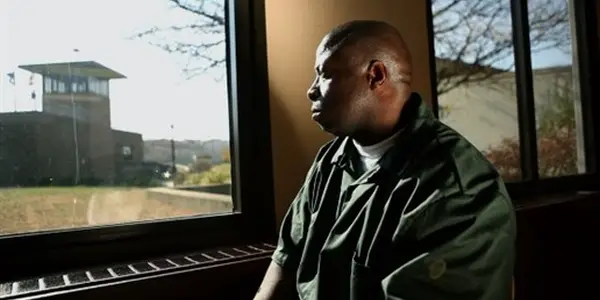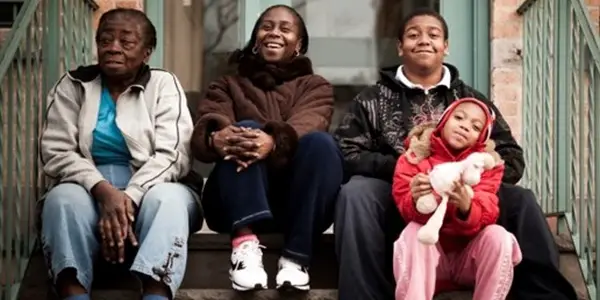DAVID & ME: Not Guilty But Imprisoned for Life (Hot Docs)

Manon de Reeper is the founder and CEO of Film…
This post first appeared on CinemaAxis.com – David & Me will be screened at the Hot Docs Canadian International Documentary Festival that takes place between April 24 and May 4, 2014.
David & Me is a documentary created Ray Klonsky and Marc Lamy – the former also being the “me” in the title. The documentary presents the life and predicament of David McCallum, a man who has been imprisoned in New York for 29 years for a murder he did not commit.
Ray, who is from Toronto, Canada, and David, who is from Brooklyn, U.S., got to know each other through Ray’s father, Ben. Ben Klonsky is a journalist who had interviewed David and other cellmates of his in the past. When Ray was around the age of 16, he was going down a path of crime himself and when his father was at his wit’s end regarding controlling his son, he asked David to correspond with Ray and tell him what prison was like. Ray and David became fast friends over the years and the Klonsky’s basically made it their life’s mission to have David exonerated and released from prison.
At first I was skeptical: I didn’t believe David was innocent – any criminal can lie and say he’s innocent, and many do, and many are so naïve to believe them. However, during this documentary, more and more evidence proves that David indeed is innocent, and the criminal justice system made a major mistake by imprisoning David and his friend, who had already died in prison in 2001.
The Personal Touch to Crime Statistics
It’s absolutely astounding to think that David has been imprisoned for 29 years – I wasn’t even alive yet when he was convicted. That he is innocent is frustrating and horrifying. I, as a criminologist, have read many cases and have seen many statistics of wrongful convictions, as well as statistics regarding the conviction of young, black men, who are grossly overrepresented in the American prison system, as well as other minorities. This documentary adds a personal touch to those statistics. David seems like a very sweet, genuine, loving family guy – at one point he calls with his niece and she’s happily chatting away about computers and dolls, then asks him a serious question about whether he’s coming home soon. It takes a moment for him to respond. You hear him take a deep breath and tell her she’s so sweet and that she’s making him cry. It was such a heartfelt scene, I couldn’t help but really feel very strongly for David and his family.

This documentary is one many should see. Governments, the news and entertainment industry always present the criminal, the convict, as the dangerous “other”, degenerates who abuse the system. This documentary shows that it isn’t as black and white as society presents it to be – David is a person, with feelings, with a family he cares about. Convicts are people, with feelings and families. Even if they committed heinous crimes, I personally do not believe that prison is the answer, and that if they have been sentenced to prison while innocent, they are truly a victim of the justice system.
Prison is an Unethical Hell
Many don’t realize how horrible the predicament of a prisoner is. Prison is an unethical hell and has been proven to be ineffective, even counterproductive, many, many times over. This is a fact to criminologists, but less so to lawmakers and the general public. There are alternatives for the prison system, but implementing them is costly (though, isn’t the prison system costly, too?) and prison sentences remain to be a very popular punishment – after all, it gives a great sense of vengeance to victims, their families and the overly sensitized media-addicted audience.
What makes it ineffective is that prisoners are isolated from society, then, when finally released after a long time, they are thrust back into society. They often lost their social network and safety net over the years – their partners left them, their family doesn’t want anything to do with them anymore, they cannot get jobs, they don’t have a place to live. To put it very bluntly, the only safe place they know is prison – they don’t know how to get around in “real life” anymore, hence they will commit a crime again just to be sentenced to prison again. Longer, stricter sentences don’t work, they only make things worse.
Corruption in Police Forces
The documentary suggests the reasons David and his friend were convicted for the murder are police corruption during the 80s crime wave in New York City and the lack of technical tools. Regarding the latter, DNA analysis would have proven David’s innocence during the trial, but that simply didn’t exist yet at the time. During the documentary, the Klonsky’s get evidence from the crime scene tested for DNA traces and it’s not David’s (or his friend’s) that they find.
Regarding the corruption: the detective in charge of the investigation in the 80s threatened David and his friend with physical violence to make them confess, and being the gullible 16-year-olds they were, David and his friend did. During the 80s, crime was at an “all time high” in NYC, and police forces just weren’t up to the task. It was just pure bad luck that David was caught in the middle; the detective needed to solve this case as quickly as possible and getting some more “blacks” off the streets was a victory whether they were guilty or not. This is never said literally in the documentary, but it is what it came down to.
Free David?
David is lucky he has such a strong social network of people that believe in him and love him. He has his devoted family and the most dedicated people around him that are trying to get him free. The Klonsky’s and the friends who help them – their devotion to David’s cause his highly admirable, but even if he’s released, nothing can make up for the crime that has befallen David – almost 30 years of his life have been taken from him.

All in all, the documentary is a very interesting one and I’m happy I saw it, and I hope many others will, too –I heartily recommend it. Whether a story about a wrongfully imprisoned man is one that interests you or not, it gives an insight in the prison system we rarely get. The documentary is creative in the way it presents the story: even though it glances over some details and occasionally explains too little, it’s touching and very well-constructed, and well worth the watch.
On a final note: Rubin “The Hurricane” Carter (famous boxer who had been wrongly convicted of murder) passed away last week, on April 20. Carter played a huge part in the battle to free David as seen in the documentary. Rest in peace, Rubin.
Does content like this matter to you?
Become a Member and support film journalism. Unlock access to all of Film Inquiry`s great articles. Join a community of like-minded readers who are passionate about cinema - get access to our private members Network, give back to independent filmmakers, and more.
Manon de Reeper is the founder and CEO of Film Inquiry, and a screenwriter/producer. Her directorial debut, a horror short film, is forthcoming in 2021.













